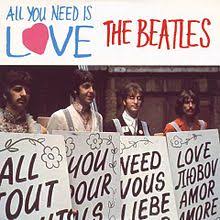So we're getting a new set of psalms in our breviary in three years five years some time or another within the next decade. But anyone interested in getting a look a the text of the Revised Grail Psalms only has to click here to check them out. At first glance, they don't seem all that different. Often entire strophes are the same in both versions. But if you read through say, a dozen of them, comparing both versions, a few things jump out at you, and these things appear (to me) to be improvements. I'll just mention just one of them today.
Love has Become Mercy
Back in the late sixties and seventies, grouchy traditionalists such as my parents and their friends would complain that "Love, Love, Love is all you ever hear about these days! Every song on the radio, every sermon at mass, it's nothing but love."
Now I'm certain that my parents had nothing against love, either of God or neighbor. Their complaint meant that love was, in their opinion, being cheapened by the incessant verbal harping on it. Also, I think they felt that we couldn't really understand or appreciate God's love if it was the only topic that was every preached about. All the other divine attributes, all the doctrines of the faith that were neglected in the false spirit of Vatican II were precisely the things that helped us understand what an amazing thing the love of God really is.
Memories of this old complaint of leaped into my mind as I noticed that psalms currently in our breviary use "love" in an awful lot of places where the Revised Grail Psalms now substitutes "mercy" or "merciful love".
Give thanks to the Lord for he is good,
His mercy endures forever. (Ps.136)
O Lord you are good and forgiving,
full of mercy to all who call. (Ps 86)
O praise the Lord, all you nations;
acclaim him, all you peoples!
For his merciful love has prevailed over us;
and the Lord's faithfulness endures forever. (Psalm 117)
Besides being (as I'm told and have no reason to doubt) a more accurate translation of what appears in the original Hebrew and Greek septuagint texts, the word Mercy tells us more about God than the word Love. It tells us what kind of love is his: merciful love. Love that we don't deserve, but receive just the same. Mercy reminds us that we are miserable sinners, the wretches saved from hell by amazing grace. Mercy reminds us of what Jesus reminded the world through St. Faustina.
Next time: Helper or Savior?
Love has Become Mercy
Back in the late sixties and seventies, grouchy traditionalists such as my parents and their friends would complain that "Love, Love, Love is all you ever hear about these days! Every song on the radio, every sermon at mass, it's nothing but love."
Now I'm certain that my parents had nothing against love, either of God or neighbor. Their complaint meant that love was, in their opinion, being cheapened by the incessant verbal harping on it. Also, I think they felt that we couldn't really understand or appreciate God's love if it was the only topic that was every preached about. All the other divine attributes, all the doctrines of the faith that were neglected in the false spirit of Vatican II were precisely the things that helped us understand what an amazing thing the love of God really is.
Memories of this old complaint of leaped into my mind as I noticed that psalms currently in our breviary use "love" in an awful lot of places where the Revised Grail Psalms now substitutes "mercy" or "merciful love".
Give thanks to the Lord for he is good,
His mercy endures forever. (Ps.136)
O Lord you are good and forgiving,
full of mercy to all who call. (Ps 86)
O praise the Lord, all you nations;
acclaim him, all you peoples!
For his merciful love has prevailed over us;
and the Lord's faithfulness endures forever. (Psalm 117)
Besides being (as I'm told and have no reason to doubt) a more accurate translation of what appears in the original Hebrew and Greek septuagint texts, the word Mercy tells us more about God than the word Love. It tells us what kind of love is his: merciful love. Love that we don't deserve, but receive just the same. Mercy reminds us that we are miserable sinners, the wretches saved from hell by amazing grace. Mercy reminds us of what Jesus reminded the world through St. Faustina.
Next time: Helper or Savior?